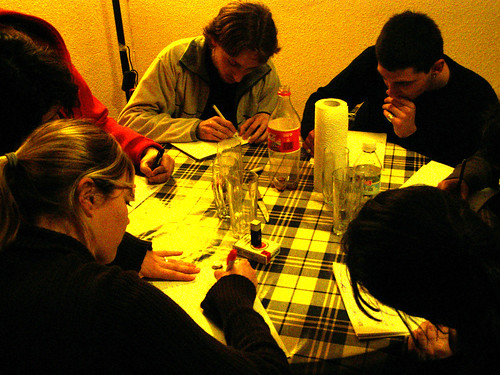
NOT LONG after I start writing a new book, I invariably come down with a raging case of "first draftitis." While most writers love the discovery aspect of the first draft, let's just say that it's not my favorite part of the process. I just want to get the story down as close to how I want it as possible, and then the fun part starts for me.
I'm an editor in my day job, so there's nothing I like more than tearing my manuscripts apart, tossing some parts out, moving stuff around, shaping the story, discovering cool plot connections, and then putting it all back together, embellishing, polishing--that's when the book truly comes to life for me.
Don't get me wrong; a lot of good stuff comes out of those first drafts. But for the most part, I have to endure first drafts to get to the stuff I really enjoy. I like fixing things, and I can't fix what I haven't written.
When I'm writing a first draft, I won't get stuck just once. I'll hit a muddy pothole every couple of chapters. If you're in a car stuck in the mud, the only thing that gunning the engine gets you is a big, muddy mess--and deeper in the hole. The way to get out is slow and easy; if you can get traction, you can get out.
The same is true with writing. Forcing yourself to gun your engine and push your way through the problem isn't going to make it go away. It'll just make the problem--and your anxiety--worse.
Pen and paper always give me the creative traction I need to get moving again. When you're wrestling with your own writing and get stuck, I highly recommend writing in this "old-fashioned" way. It's how I used to write before computers. Without my computer, I don't have access to my notes. No notes means no sidetracking and no confusing the core story with things I think I might need to include.
Writing longhand also keeps me focused on the scene I'm writing, which helps immerse me in the story, so I can get honest, genuine dialogue. And I can dig deeper into the story rather than skimming the surface by trying to fit in everything my notes say I should.
Having no notes to refer to also makes it harder to put words in my characters' mouths (which is a big nono). It makes me shut up, watch and listen.
And when I truly listen, I find myself in the writer's "sweet spot"--where I'm not writing dialogue, I'm eavesdropping. I'm inside the story, with real people, not characters. I'm in a magical place--the place where you want your readers to be.
--Lisa Shearin, the author of Bewitched & Betrayed and other nationally bestselling fantasy-adventure novels, lives in North Carolina and blogs about fiction writing at www. lisashearin.com.
Source Citation
Shearin, Lisa. "Back to basics with pen and paper." The Writer June 2010: 10. General OneFile. Web. 27 Apr. 2010.
Document URL
http://find.galegroup.com/gps/infomark.do?&contentSet=IAC-Documents&type=retrieve&tabID=T003&prodId=IPS&docId=A224520497&source=gale&srcprod=ITOF&userGroupName=22054_acld&version=1.0



No comments:
Post a Comment